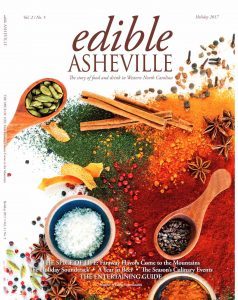TOGETHER AT THE TABLE
The connections linking food and social justice
BY MEREDITH LEIGH | PHOTOS BY ERIN ADAMS
“I was always a leader in my community, but maybe not leading people to do the best things,” said Kikkoman Shaw, sitting at a picnic table outside Asheville Housing Authority’s Southside Kitchen on a recent afternoon. Shaw leads a crew of Black chefs at the kitchen who use organic ingredients to cook daily meals for homebound, elderly, and disabled residents in Asheville’s low-income communities of color.
A graduate of Green Opportunities’ now-defunct Kitchen Ready culinary training course, he cites the mentorship of renowned Asheville chef and former Kitchen Ready program manager Mark Rosenstein as a touchstone for learning the type of leadership he now provides to his team. “There is a difference between this food and the food that people in poverty normally eat. And this is one thing I can do to take a little bit of stress out of people’s day,” Shaw said.
The work Shaw and his team are doing at Southside Kitchen has been getting a lot of attention for the impact it has on low-wealth communities, the connections the program has leveraged across Asheville’s food system, and the bearing it has on the difficult overlap between injustice and hunger, which is often not obvious to the everyday eater. Asheville has been celebrated as a progressive food city, but food insecurity in Buncombe County is still slightly higher than the national average of 12%, according to Feeding America.
The U.S. Department of Agriculture defines food security as “access by all people at all times to enough food for an active, healthy life.” So while the word “hunger” may suggest a complete lack of food, food insecurity can actually refer to an abundance that is low in nutrition or describe situations in which there are barriers to access or even a cultural understanding of what is available as food. Food insecurity can impact multiple aspects of livelihood, from causing mood swings to limiting a person’s ability to work or care for family.
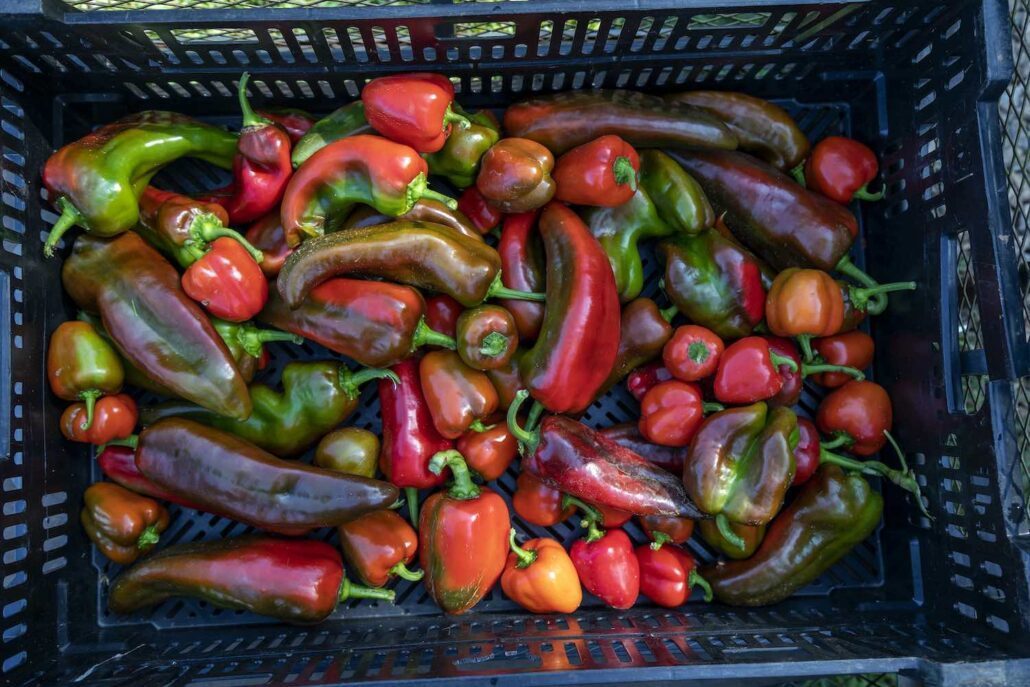 The ingredients that go into the meals Shaw and his team prepare come from multiple sources, but a highlight this season has been a collaboration of local farmers, chefs, and community members known as We Give A Share. Through the initiative, local residents can contribute to sponsor a CSA share for other families. The money is pooled and disbursed to local farmers through contracts with Southside Kitchen to ensure that Shaw can order fresh food in quantity throughout the growing season. “It’s bringing people together who wouldn’t normally have come together,” said Shaw.
The ingredients that go into the meals Shaw and his team prepare come from multiple sources, but a highlight this season has been a collaboration of local farmers, chefs, and community members known as We Give A Share. Through the initiative, local residents can contribute to sponsor a CSA share for other families. The money is pooled and disbursed to local farmers through contracts with Southside Kitchen to ensure that Shaw can order fresh food in quantity throughout the growing season. “It’s bringing people together who wouldn’t normally have come together,” said Shaw.
Aaron Grier, a We Give A Share co-founder and co-owner of Gaining Ground Farm in Leicester, agreed. “It’s super rad to think that someone dining at Cucina 24 could have the same ingredients as someone eating delivered meals in affordable housing and the same as someone shopping at the tailgate market,” he said.
The idea that everyone dines at the same buffet hasn’t been the norm, with charity and emergency food relief being the bulk of Asheville’s established answer to food insecurity. “Most of that food has traditionally been seconds or surplus. But there is inequity in saying, ‘Here, you can have our seconds,’” Grier says. We Give A Share aims to change this by providing only high-quality food to Southside Kitchen. “Anything that doesn’t meet Kikkoman’s standards can be rejected,” he added.
‘Something we all share’
With close to 12.5% of the population of Buncombe County facing uncertainty when it comes to accessing food, there is, of course, a dire need to feed people using whatever is available. But local specialists iterate that the current system doesn’t always address the root causes of the hunger problem, nor does it address the many types of hunger contained in the so-called “foodtopia” of Asheville.
“The question is: How do we make our system sustainable so that charity is no longer needed?” said Ali Stone, programs manager at the Fairview-based nonprofit Root Cause Farm. Root Cause grows fresh produce using organic practices, but instead of selling its harvests, the organization donates to local emergency food distribution operations. “We do have one foot in the food relief aspect, but we also have the other foot in systems education,” Stone explained.
Before COVID-19 hit, Stone and Root Cause manager Janice Brewer were engaging hundreds of people each year using weeding as a metaphor for rooting out injustice and spending dedicated time with volunteer groups talking about the root causes of hunger. To do so, the pair uses a visual exercise they have adapted from the Highlander Research and Education Center, a social justice leadership training school in Tennessee.
“We draw a tree on a board, and then we facilitate a journey asking them to visualize hunger as a tree,” Brewer explained. “The leaves are the outward signs of hunger. The branches and the trunk are the intermediate causes. And the roots are the underlying— sometimes hidden— causes.”
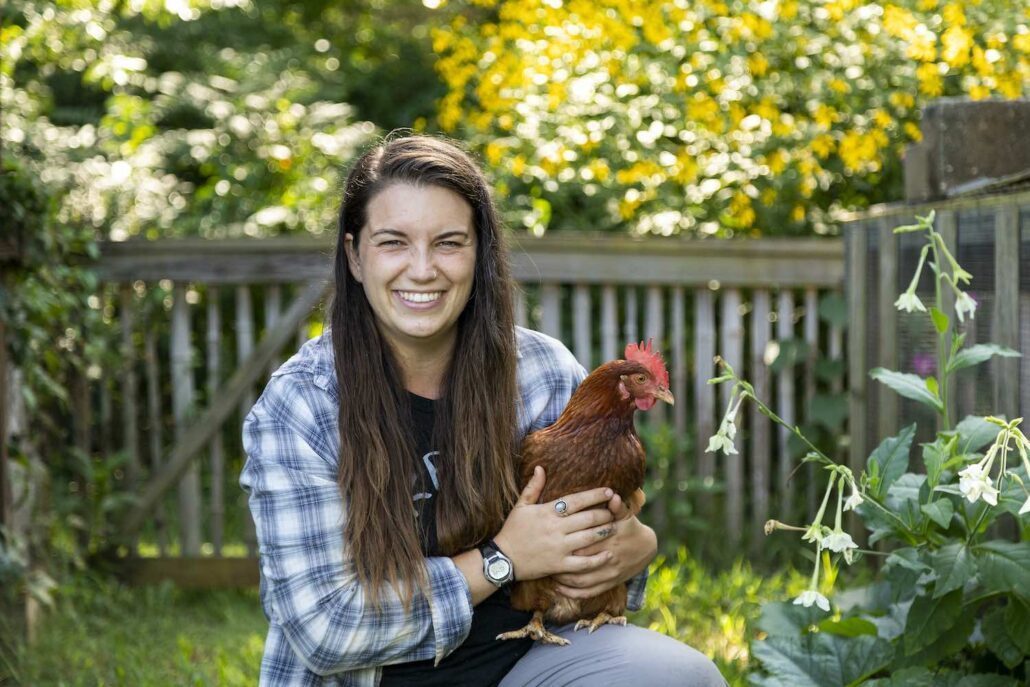 While responses may differ based on personal values and cultural experience, Brewer and Stone see a trend in the answers they receive. “The leaves of the hunger tree are things like fatigue, depression, and poor performance at school or at work,” Brewer said. “The trunk and branches might be low wages, lack of transportation, eviction, or homelessness.”
While responses may differ based on personal values and cultural experience, Brewer and Stone see a trend in the answers they receive. “The leaves of the hunger tree are things like fatigue, depression, and poor performance at school or at work,” Brewer said. “The trunk and branches might be low wages, lack of transportation, eviction, or homelessness.”
“The roots are where the conversation can become uncomfortable,” said Stone. “People bring up racism, greed, the government, sin, and other reasons for the root causes of hunger. People do disagree, but they also begin to realize that hunger isn’t just a physical issue, it can be emotional, cultural, and spiritual. And, it’s something we all share.”
Brewer added that one of the most powerful things about the activity is that she and Stone don’t actually teach people anything new. “It’s like everyone has this knowledge within themselves.”
Even if the knowledge is cellular, social justice issues are complex, and the connections between food and justice aren’t immediately obvious to everyone. Darcel Eddins, a long-time community activist and executive director of Bountiful Cities, said the issues are “part of ancestry.”
She and Brewer both assert that people have been systematically disenfranchised from the right to food since before Asheville was a city. “If tourists or foodies in Asheville don’t experience proximity to food injustice,” said Brewer, “then it’s easy to forget that it exists.”
Eddins agreed. “Affluent people tend to think of hunger like it’s something that doesn’t touch them, “ she said.
When Eddins started working in low-income communities like Shiloh and Burton Street in the early 2000s, she came to understand that food insecurity was intrinsically tied to segregation. “When we talk about hunger and nourishment, it doesn’t stop where it is now or where it’s perceived. Asheville is a very segregated city, by race and by class. The roots are very deep,” she said.
Her response, through Bountiful Cities, has been to provide the means to grow gardens and redistribute resources to disenfranchised communities in particular. Aside from making grants to community gardens, including those in low-wealth neighborhoods, and facilitating education for all ages in horticulture and gardening, Bountiful Cities was instrumental in bringing nonprofit leaders together to collaborate on how to address food injustice and in the development of the Asheville Buncombe Food Policy Council.
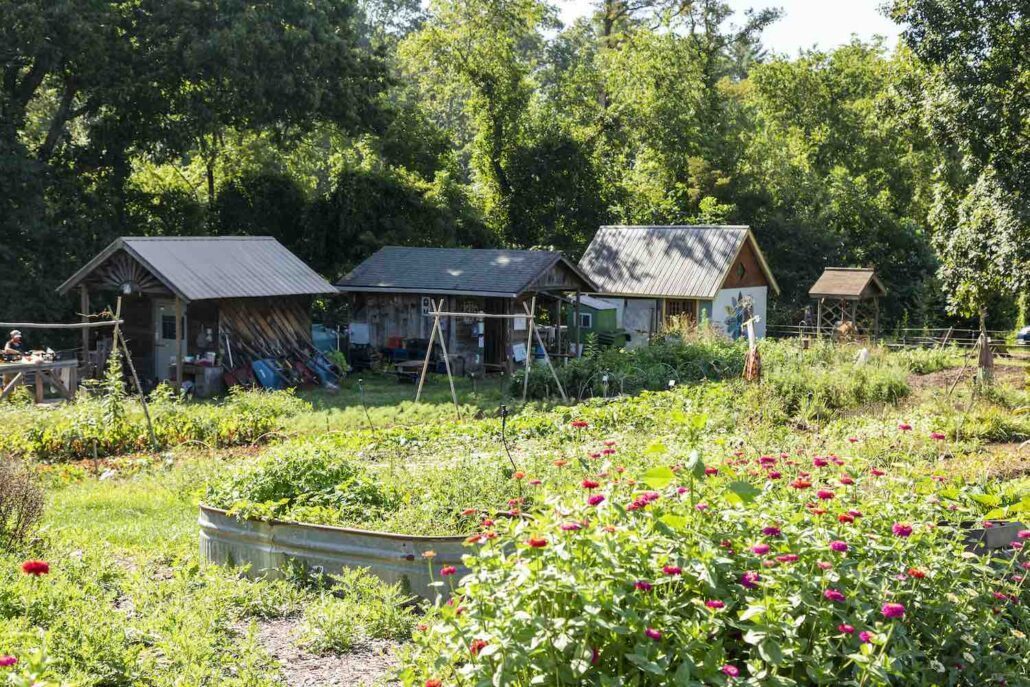 “The traditional nonprofit model is all about who can tell the best hardship story, not how can we make the biggest impact. So how do we as systems changers shift the model of funding to support the neighborhoods themselves and also cultivate relationships to forge pathways that will help people develop their own projects?” Eddins asked. “Systems change requires risk, and it appears we have the opportunity. Will we have the courage and the will?”
“The traditional nonprofit model is all about who can tell the best hardship story, not how can we make the biggest impact. So how do we as systems changers shift the model of funding to support the neighborhoods themselves and also cultivate relationships to forge pathways that will help people develop their own projects?” Eddins asked. “Systems change requires risk, and it appears we have the opportunity. Will we have the courage and the will?”
Deeper change
Grier shared a similar story. “So many of us farmers have been growing food for restaurants, but we want to work on the bigger picture,” he said. “When we talk to funders, however, it’s all about buying a new tractor for a farmer. We already have the tractor. Why is it some kind of a revelation to just pay farmers to grow food?”
The framework at We Give A Share attempts to address this by pooling community donations toward larger wholesale contracts for farmers, allowing farmers to scale up and do what they do best more successfully. As of this writing, the program has expanded to include several area farms, although it does not yet have members who are new to farming or farmers of color. “Next season, Gaining Ground Farm will step aside and make room for more beginner farmers and farmers in the margin who really need these larger volume sales,” Grier said.
The need for deeper change is also rippling through the restaurant community in Asheville as both the pause in business from the coronavirus pandemic and protests spurred by the murder of George Floyd in May led to an increased awareness of the fragility of the industry and the deep divisions within it. Across the sector, owners of food-based businesses are starting to examine how injustice shows up internally. Jess Reiser, CEO and co-founder of Burial Beer Co. and Forestry Camp Bar and Restaurant, has placed an emphasis on equity within her businesses since May.
“We have a long way to go, but we have hired a consultant and have started having difficult conversations within our leadership team.” said Reiser, who moved to Asheville several years ago with her business partners, one of whom is her husband. One of the aims of their move from Seattle to Asheville was to increase the positive financial impact of their business on the community. “We realize that we could still be doing so much more,” she said. Not only is the company examining its ongoing donations and philanthropy efforts, but it’s also taking a deeper look at how it can make space for marginalized voices and change power dynamics within businesses.
“We’re asking ourselves how power shows up and why,” Reiser says. “Some things have to be done a certain way to get the beer brewed the same way every time. But some things we do because I might have held onto that idea of order or job performance as the only way, and I want to change that.” Reiser, as well as other owners and influencers in town, are working to make empowerment and equity the norm instead of relying only on the model of charity from wealth.
Local community organizer Nicole Townsend, who offers equity assessments and consulting for businesses and organizations, has seen an increase in the awareness of systemic issues. “The global pandemic has caused people to ask deeper questions. Landowners and business owners are asking, how can we ensure that in 10 to 15 years we aren’t just meeting the immediate needs?” she said.
Eddins is encouraged by the increased awareness but offers a caution as companies join in the work toward more lasting change: “I think the questions are, how are we going to examine wealth accumulation? And how are these restaurants and programs going to keep up their work?”
Townsend’s advice is to work inwardly to find the gaps within our businesses, families, and inner circles before looking outward at the community. “There are so many ways in which injustice shows up that it can be very overwhelming,” she said. “We have to take the time to figure out what our lane is and be superheroes in that lane.
That is when change comes.”
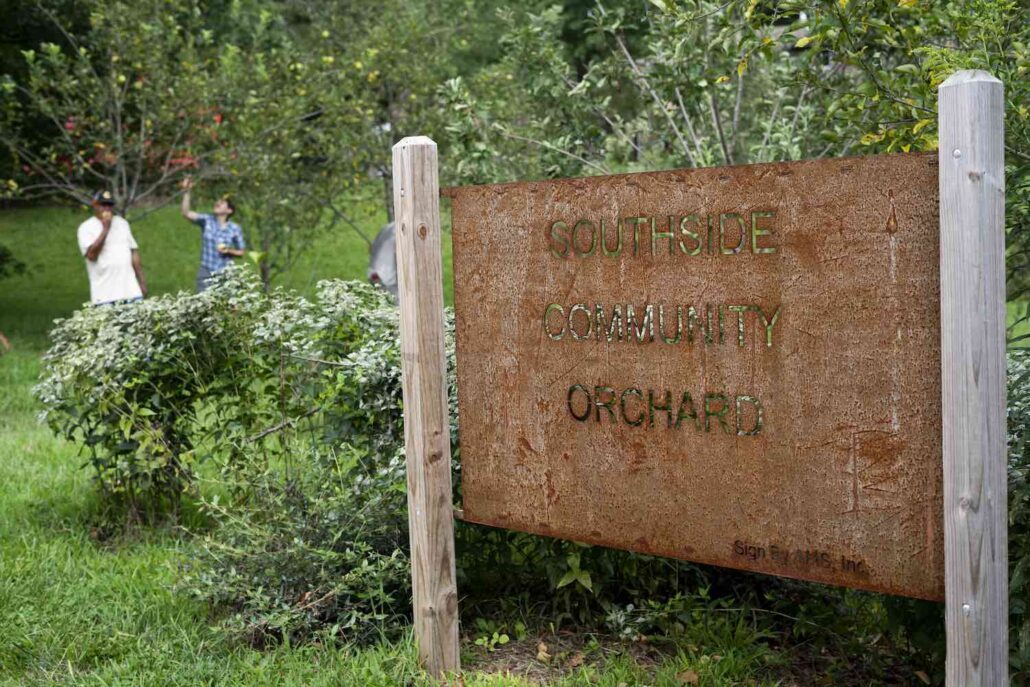 Mark Rosenstein, who Kikkoman Shaw cited as a mentor and has otherwise been instrumental in Southside Kitchen’s development, shared where he feels Southside Kitchen’s lane will have the most impact: “The Kitchen feeds people well, but the key to the justice piece is empowering leaders within under-resourced communities.”
Mark Rosenstein, who Kikkoman Shaw cited as a mentor and has otherwise been instrumental in Southside Kitchen’s development, shared where he feels Southside Kitchen’s lane will have the most impact: “The Kitchen feeds people well, but the key to the justice piece is empowering leaders within under-resourced communities.”
Without power-sharing through opportunity for leaders of color and actively listening to the needs of those who have been marginalized, work to alleviate the many forms of hunger in Asheville is merely a cycle that ends up perpetuating problems and widening the gap between people and vital resources in the community. “I have to stand up,” says Shaw of his own position of leadership. “If I don’t, the cycle continues. I have to plant the seed.”
As COVID continues, We Give A Share has raised over $150,000 from individuals in the community with close to 400 donors supporting the bridge between quality food and community nourishment and Southside Kitchen packing as many as 500 meals per day during the height of lockdown. As the program grows and changes, one vision for its future is to retool the training aspect of the kitchen to reestablish the educational component that gave Shaw the opportunity to hone his natural leadership skills.
Getting at the roots of hunger remains multifaceted work and doesn’t just happen in the kitchen or on the farm. Food justice efforts can be found within anti-poverty initiatives, support for affordable housing, labor and wage justice work, public policy, and even transportation reform. “The food system touches almost every other system,” Brewer said.
“We talk about everybody’s plate looking the same across the socioeconomic spectrum,” Grier said. “It’s a simple idea that is actually very complicated.” ◊◊
Meredith Leigh is the author of The Ethical Meat Handbook: Mindful Meat Eating for the Modern Omnivore and Pure Charcuterie: The Craft and Poetry of Curing Meats at Home. She is a nationally recognized educator in farming, cuisine, and food systems. She also writes poetry, essays, and other non-fiction about the intersections between land and people and land and the culinary sphere. Her work has been featured in the James Beard Foundation blog, Food52, Taproot Magazine, and others. She lives with her partner and four children in Asheville.
Save
Save
Save
Save
Save
Save
Save
Save
Save
Save
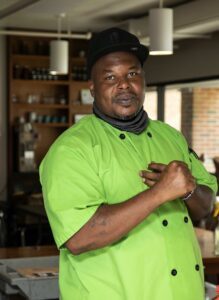
Kikkoman Shaw of Southside Kitchen
THE WEEKLY REVEL
Sign up for your free handpicked guide to enjoying life around Asheville.
Available weekly from May to October.


